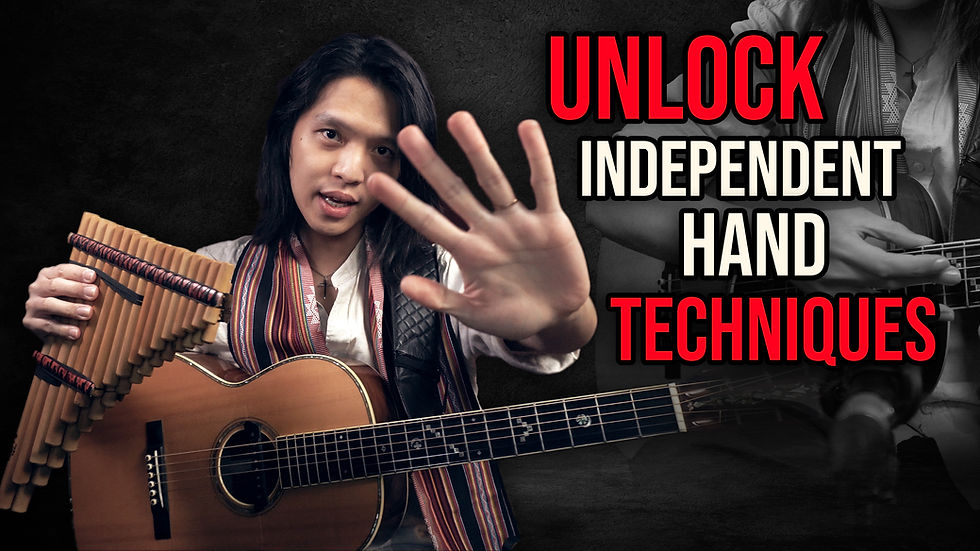What does it take to be a REAL musician? (Guitarists Listen Up!)
- Neil Chan

- Jun 7, 2022
- 3 min read
Did you know that anyone and everyone can easily call themselves a musician today? If you sing a song, or strum a chord, you’re making ‘music’ and therefore technically - you are a musician!
But I’m not talking to those people… I’m talking to you! You - the REAL musician, or at least someone who aspires to be a REAL musician.
Okay… what’s a REAL musician? There isn’t such a technical term in existence, but who I’m referring to is simply the ideal musician that YOU want to be. Yes, it’s about carving your personal identity as a musician.
In order to carve out this identity, you need to consider two main factors - what music you make and who you are making the music for.
What Music You Make
First you need to think about the style of music you want to create. Is it jazz, rock, pop, classical, flamenco, carnatic… Of course you don’t need to stick to one permanently, and you can learn multiple styles, but you need to narrow down your focus. If you want to play everything, then you don’t really have a unique identity as a musician.
Depending on which style you choose, it will inform whether the music you make is largely composed or interpreted by you. Note that when you play music composed by someone else, you still play a big role in interpreting that piece with your personal identity as a musician.
In the realm of classical music or jazz, you’re a lot more likely to play other people’s work such as sonatas and standards. On the other hand, a rock musician will likely compose music from their own personal experiences, as that is the nature of rock music.
These are norms, of course, and you can go against the norm. But you need to realise that these norms also inform what your audiences want to hear. There are certain audience expectations of a jazz musician, a classical one, a rock one, a flamenco one, and you need to be keenly aware of them as you carve out your musician identity.
Who Your Audiences Are
Broadly, you could define your audience as a ‘jazz’ community, or a ‘fingerstyle guitar’ one. But I want you to be a lot more specific and think - Who are these individual people you will be performing to? Is it a classical music aficionado who is well versed in music history and performance practice? Is it a jazz enthusiast who can name every single jazz standard in existence? Is it a casual listener who enjoys singing along to music in the shower? Is it a close friend who adores the personal and poetic lyricism in your music?
Each of these audiences will inform the type of music you play - if you’re playing to a classical music aficionado, you need to play what is expected of excellent performers in that genre. You will be interpreting master works by accomplished composers, most of whom are no longer living.
If you’re playing to casual listeners, perhaps you can be more fluid in writing your own music and playing popular pieces, but you must make your music accessible to the lay listener - it must be easy to appreciate (catchy melodies and groovy rhythms fall into this category).
Are You Comfortable With YOUR Musician Identity?
You need to ask yourself if you are comfortable with the musician you envision yourself as. This is your musician identity!
Are you OKAY to play other peoples’ compositions and interpret them creatively to discerning listeners?
Are you OKAY to write original music, with the caveat that you may have to tailor your music to suit the artistic preferences of your audiences?
Are you OKAY to push the boundaries of jazz music and compose new music with innovative percussive techniques on the acoustic guitar, accepting the reality that it may take a long while for audiences to recognise and appreciate your music?
If not, you need to rethink your identity so that you avoid working on your musicianship journey toward a goal you aren’t even comfortable with.
Here’s my ideal musician identity - I want to blend carnatic, jazz, and flamenco music on fingerstyle guitar, using music to share stories and express emotions across cultures. I want to perform this music to audiences interested to learn about cultures other than their own, willing to open up their ears to appreciate new sounds and as a result understand new perspectives and lifestyles.
What is YOUR musician identity?
By Neil Chan

.png)




For music students and teachers, finding affordable and accessible staff paper for musicians is always a plus. Online platforms that provide free, printable staff paper templates are a game-changer. You can select from various layouts, ensuring you have the correct format for piano, voice, or specific instruments. This convenience means you can easily print out sheets for homework, practice exercises, or compositional work without having to purchase physical notebooks every time. It’s a practical resource that supports music education and creativity by making essential materials readily available.